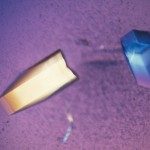Link to Pubmed [PMID] – 29346371
PLoS Negl Trop Dis 2018 01;12(1):e0006160
Leishmaniases are neglected parasitic diseases in spite of the major burden they inflict on public health. The identification of novel drugs and targets constitutes a research priority. For that purpose we used Leishmania infantum initiation factor 4A (LieIF), an essential translation initiation factor that belongs to the DEAD-box proteins family, as a potential drug target. We modeled its structure and identified two potential binding sites. A virtual screening of a diverse chemical library was performed for both sites. The results were analyzed with an in-house version of the Self-Organizing Maps algorithm combined with multiple filters, which led to the selection of 305 molecules. Effects of these molecules on the ATPase activity of LieIF permitted the identification of a promising hit (208) having a half maximal inhibitory concentration (IC50) of 150 ± 15 μM for 1 μM of protein. Ten chemical analogues of compound 208 were identified and two additional inhibitors were selected (20 and 48). These compounds inhibited the mammalian eIF4I with IC50 values within the same range. All three hits affected the viability of the extra-cellular form of L. infantum parasites with IC50 values at low micromolar concentrations. These molecules showed non-significant toxicity toward THP-1 macrophages. Furthermore, their anti-leishmanial activity was validated with experimental assays on L. infantum intramacrophage amastigotes showing IC50 values lower than 4.2 μM. Selected compounds exhibited selectivity indexes between 19 to 38, which reflects their potential as promising anti-Leishmania molecules.


